Filter by
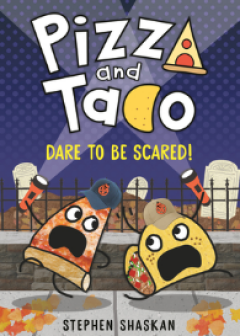
Dare to be scared!
"Flashlights? Check! Scary movies? Check! Ghost Peppers?! Pizza and Taco are ready to prove they're brave as can be in their latest graphic chapter book! Nothing scares these besties...or so they say. Pizza and Taco aren't afraid! To prove it, they dare each other to be scared. Dark closets and scary movies are a piece of cake—kind of. They're ready for the ultimate test—Ghost Pepper hun…
- Edition
- -
- ISBN/ISSN
- 9780593481288
- Collation
- 58 p. ; ill.; 21,5 cm
- Series Title
- Pizza and Taco #6
- Call Number
- F SHA d
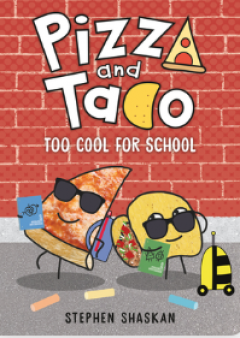
Too cool for school
B.L.T. wears sunglasses--even in school! He's not even worried about being late to class. SO COOL! I mean, "whatever." Pizza and Taco quickly pick up on what's cool--and what's not--by watching B.L.T.'s every move. Will that spell t-r-o-u-b-l-e for Pizza and Taco with their teacher, Mr. Apple?
- Edition
- -
- ISBN/ISSN
- 9780593376072
- Collation
- 58 p. ; ill.; 21,5 cm
- Series Title
- Pizza and Taco #4
- Call Number
- F SHA t
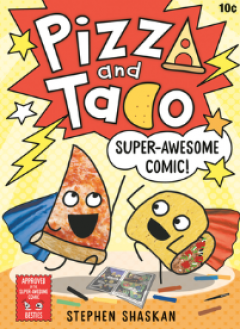
Super-awesome comic!
When you love comics like Pizza and Taco do, the next step after reading them is to collaborate on one!! But what happens when they run up against "artistic differences?" Who gets to have the bigger muscles and the more rad superpowers? Can these two strong-willed foodstuffs compromise and make a comic that is more awesome than the sum of its parts?
- Edition
- -
- ISBN/ISSN
- 9780593376034
- Collation
- 58 p. ; ill.; 21,5 cm
- Series Title
- Pizza and Taco #3
- Call Number
- F SHA s
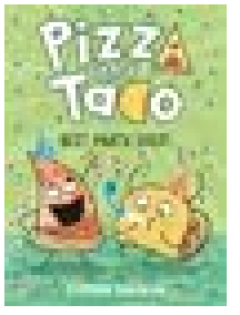
Best party ever!
"Pizza and Taco are bored, so they decide to throw an awesome party! What could possibly go wrong? Pizza and Taco have the oh-so-relatable problem of not knowing what to do when boredom strikes. The answer? Throw a party! They have a location, and a guest list, and decorations. Everything is perfect . . . until it isn't. In fact, it's kind of a DISASTER! Ice Cream has a meltdown, and who kne…
- Edition
- -
- ISBN/ISSN
- 9780593123348
- Collation
- 58 p. ; ill. ; 21,5 cm
- Series Title
- Pizza and Taco #2
- Call Number
- F SHA b
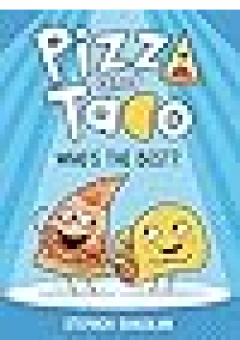
Who's the best?
The first in a lower grade graphic novel series about Pizza and Taco. Two best friends, lots of toppings...but only one of them can be the BEST, right? Best friends are the BEST! But WHO is the BEST? Is it Pizza or Taco? The question is debatable! They both love water slides. They both are friends with Hot Dog and Hamburger. In fact, maybe they should have a debate and get their friends to VOT…
- Edition
- -
- ISBN/ISSN
- 9780593123300
- Collation
- 68 p. ; ill. ; 21,5 cm
- Series Title
- Pizza and Taco #1
- Call Number
- F SHA w

Journey to the center of the Earth
Professor Otto Lindenbrock, a curious scientist, finds an odd piece of parchment with a mysterimouse message. He decides to follow its clues to see what he might find. This begins an incredible adventure that will lead him to the center of the earth!
- Edition
- -
- ISBN/ISSN
- 9781338314625
- Collation
- 207 p. ; ill. ; 19 cm
- Series Title
- Geronimo Stilton Classic Tales
- Call Number
- F STI j
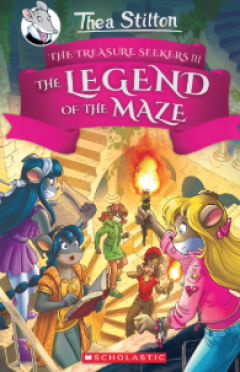
The legend of the maze
The search for the seven secret treasures continues. In this incredible adventure the Thea Sisters come across the legendary Jewel of the Queen. They cross rivers of ice, deserts of fire, and other fascinating places on their journey to find it.
- Edition
- -
- ISBN/ISSN
- 9781338687224
- Collation
- 320 p. ; ill. ; 19,5 cm
- Series Title
- The treasure seekers III
- Call Number
- F STI l
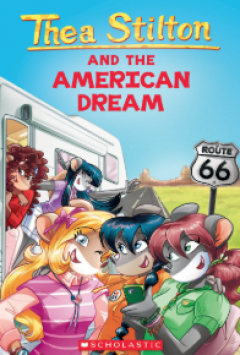
Thea Stilton and the American dream
Thea Sisters are taking a road trip across America along Route 66! They stop in Chicago, St. Louis, and other cities on the way to San Jose. Their friend, Ali, is a programmer and she has a chance to have her project turned into a real video game. But, while they are on the road someone wipes her computer and all of her hard work is lost! Can the mouselets figure out what happened and help her …
- Edition
- -
- ISBN/ISSN
- 9781338687071
- Collation
- 176 p. ; ill. ; 19 cm
- Series Title
- Thea Stilton #33
- Call Number
- F STI t

Mice on the runway
- Edition
- -
- ISBN/ISSN
- 9781338052855
- Collation
- 112 p. ; ill. ; 19 cm
- Series Title
- Thea Stilton Mouseford Academy
- Call Number
- F STI m
- Edition
- -
- ISBN/ISSN
- 9781338052855
- Collation
- 112 p. ; ill. ; 19 cm
- Series Title
- Thea Stilton Mouseford Academy
- Call Number
- F STI m

Puisi baru
Buku ini cemacam biografi ringkas para penyair 'Poedjangga Baroe' beserta contoh-contoh puisinya yang ternama. Mereka adalah: Selasih, Daeng Mijala, Moh. Yamin, Aoh Kartahadimadja, A. Hasjmy, M.R. Dajoh, Suman Hs., J.E. Tantekeng, S. Takdir Alisjahbana,
- Edition
- -
- ISBN/ISSN
- 9795234102
- Collation
- 162 p., 20,4 cm.
- Series Title
- -
- Call Number
- 801 ALI p
 Computer Science, Information & General Works
Computer Science, Information & General Works  Philosophy & Psychology
Philosophy & Psychology  Religion
Religion  Social Sciences
Social Sciences  Language
Language  Pure Science
Pure Science  Applied Sciences
Applied Sciences  Art & Recreation
Art & Recreation  Literature
Literature  History & Geography
History & Geography